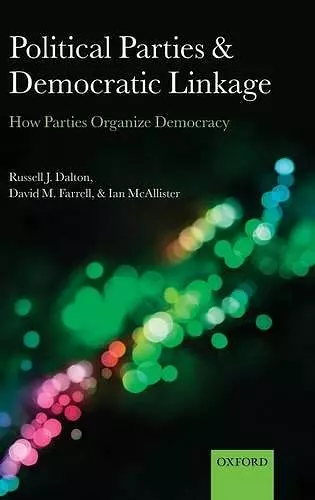Political Parties and Democratic Linkage
How Parties Organize Democracy
Ian Mcallister author David M Farrell author Russell J Dalton author
Format:Hardback
Publisher:Oxford University Press
Published:29th Sep '11
Currently unavailable, and unfortunately no date known when it will be back

Is the party over? Parties are the central institutions of representative democracy, but critics increasingly claim that parties are failing to perform their democratic functions. This book assembles unprecedented cross-national evidence to assess how parties link the individual citizen to the formation of governments and then to government policies. Using the Comparative Study of Electoral Systems and other recent cross-national data, the authors examine the workings of this party linkage process across established and new democracies. Political parties still dominate the electoral process in shaping the discourse of campaigns, the selection of candidates, and mobilizing citizens to vote. Equally striking, parties link citizen preferences to the choice of representatives, with strong congruence between voter and party Left/Right positions. These preferences are then translated in the formation of coalition governments and their policies. The authors argue that the critics of parties have overlooked the ability of political parties to adapt to changing conditions in order to perform their crucial linkage functions. As the context of politics and societies have changed, so too have political parties. Political Parties and Democratic Linkage argues that the process of party government is alive and well in most contemporary democracies.
this is an important and germane book that significantly contributes to the debate on the role of political parties. * Jae-Jae Spoon, Comparative Political Studies *
Political Parties and Democratic Linkage offers a valiant defence of the often lamented role of parties in contemporary democratic processes. Dalton, Farrell and McAllister argue that despite their poor public image, parties still dominate elections, that newly incumbent governments are more closely connected to citizen preferences than their predecessors in office, and that voter opinion, operating through parties, matters for policy outputs. This is an important book for students of parties as well as for students of democracy. * Peter Mair, Professor of Comparative Politics, European University Institute, Florence *
- Winner of Winner of the 2012 GESIS Klingemann Prize for the Best CSES Scholarship.
ISBN: 9780199599356
Dimensions: 236mm x 151mm x 28mm
Weight: 538g
258 pages